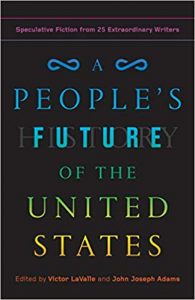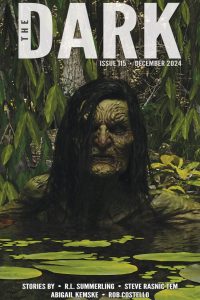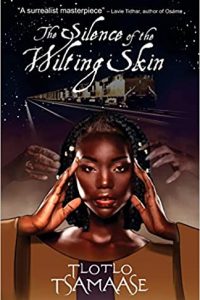Gary K. Wolfe Reviews A People’s Future of the United States, edited by Victor LaValle & John Joseph Adams
 A People’s Future of the United States, Victor LaValle & John Joseph Adams, eds. (One World 978-0-5255-0880-9, $23.00, 410pp, tp) February 2019.
A People’s Future of the United States, Victor LaValle & John Joseph Adams, eds. (One World 978-0-5255-0880-9, $23.00, 410pp, tp) February 2019.
I’ve grumbled before in this space about how dystopia – which by now has nearly grown independent of SF in the popular imagination – may have become the default model for the future simply because, these days at least, it makes fewer imaginative demands than almost any other kind of future. In conceiving A People’s Future of the United States, Victor LaValle writes in his introduction, he and co-editor John Joseph Adams took inspiration from Howard Zinn’s A People’s History of the United States (1980, with several later revisions), which viewed American history through the lens of everyday people – women, minorities, immigrants, factory workers, Native Americans, etc. In soliciting the 25 stories that make up the anthology, they rather optimistically wrote of “new forms of freedom, love, and justice … writing that gives us new futures to believe in.” If that was really the intent, not all the missiles landed where expected. Writers, of course, are notorious for not dutifully following prompts, and I doubt that many of these futures are ones we’ll want to believe in: a US in total collapse, everything but heterosexuality outlawed, doomsday plagues, California at war with the remainder of the US, books completely banned, minorities sent to relocation camps, women’s rights rescinded, the Thirteenth Amendment facing repeal to permit the return of slavery, new forms of gay conversion therapy, racist robots, and of course a Big Wall (though it’s not serving quite the function you’d expect). The characters, for the most part, are indeed the working people of the sort that Zinn’s book championed, and many of the stories are powerfully written and passionately felt, but there’s also the inescapable sense of wandering through a dystopian theme park where each ride is scarier than the last.
LaValle & Adams have assembled an impressively diverse group of contributors, not only in cultural terms but in terms of their relationships to genre. In addition to broadly familiar SF names like Catherynne M. Valente, Seanan McGuire, Tobias Buckell, N.K. Jemisin, Charlie Jane Anders, and Sam J. Miller, there are a few who straddle the borders, like Charles Yu, and quite a few likely less familiar to SF readers than to those who follow the litzines, such as Lizz Huerta, Lesley Nneka Arimah, Gabby Rivera, and Kai Cheng Thom. Not surprisingly, this leads to a diverse array of approaches to the material, ranging from A. Merc Rustad’s bluntly Orwellian “Our Aim is Not to Die”, with its state-defined “Ideal Citizen” threatening anyone non-binary with “neural reformatting therapy” (and a rather wishful-thinking resistance fueled by benevolent AIs) to Catherynne M. Valente’s almost surreal “The Sun in Exile”, in which the sun itself is placed on trial for treason by Papa Ubu, a sort of Trump figure as he might have been imagined by Alfred Jarry. A more literal, if more cartoonish, version of Trump (not named, of course) learns a lesson in American diversity in Ashok K. Banker’s “By His Bootstraps” (only the opening seems borrowed from Heinlein), an odd mix of cosmic comedy and blatant didacticism. More effective uses of humor can be found in N.K. Jemisin’s “Give Me Cornbread or Give Me Death”, in which the genetically engineered dragons used as weapons of oppression get co-opted by their unexpected love of spicy Southern cooking, and Charles Yu’s “Good News Bad News”, a series of futuristic news bulletins, several of which return to an account of a service robot whose inadvertently racist programming leads to a confrontation with an innocent family in a rural diner.
A more restrained approach, and one of the strongest stories in terms of character, is Sam J. Miller’s “It Was Saturday Night, I Guess That Makes It All Right”, whose narrator makes a living installing phone-cloning devices to enable constant surveillance; the homophobic and global-warming themes are no less powerful for taking a backseat to his fears and frustrations. It’s probably an overgeneralization to claim that writers more comfortable with SF tropes are less likely to feel the need to foreground them, but Charlie Jane Anders’s “The Bookstore at the End of America” is centrally about the denizens of a bookstore that straddles the border between California and “America,” with the cultural and water wars that led to the schism only gradually revealed. A “Deluge Bowl” created by coastal flooding is only mentioned as background in Omar El Akkad’s “Riverbed”, which is primarily concerned with relocation camps set up as the result of a blatantly racist executive order; the story gains power by being told from the perspective of a survivor of one of the camps returning to the site in Montana years later. Similarly, the disastrous privatization of government functions only gradually becomes apparent in G. Willow Wilson’s “ROME”, while the genuine suspense of the story arises from a group of students trying to complete a test before a massive Seattle fire overtakes their school, the result of an underfunded “fire abatement” subscription service that has effectively replaced tax-funded public services. One of the most original ideas, in Tobias Buckell’s “The Blindfold”, depicts an effort to reduce racial bias in criminal trials by literally forcing jurors to see defendants as white (through a kind of VR helmet) – though he also shows how this system can be skewed.
If many of the stories here offer grim portrayals of outsiders trying to survive political and cultural oppression, there are also some which hold out the promise of community. In Maria Dahvana Headley’s “Read After Burning”, it’s a community of librarians, preserving literary works by tattooing their own skins long after books have been banned, rather as in Fahrenheit 451, with which the story bears obvious comparisons. In Daniel H. Wilson’s “The History of Barbed Wire”, it’s a walled-off Cherokee nation surviving as a bulwark against a chaotic outside US where – once again – the government has been largely privatized. In the closest story to approach a utopian idea, Seanan McGuire’s Bradbury-flavored “Harmony” tells of a same-sex married couple who, frustrated with the discrimination that they face even in a world in which “identity was up to the individual and not a government agency,” decide to buy an abandoned town in northern California, with the idea of building a community of tolerance. For all the rapacious corporations, repressive governments, and scabrous presidents that terrorize us in many of the stories here, McGuire’s gentle tale may be the one to most directly identify the problem with the American future: “it was the nature of humans to be cruel to things they didn’t understand, or approve of, or believe in.” In other words, just like it’s always been.
Gary K. Wolfe is Emeritus Professor of Humanities at Roosevelt University and a reviewer for Locus magazine since 1991. His reviews have been collected in Soundings (BSFA Award 2006; Hugo nominee), Bearings (Hugo nominee 2011), and Sightings (2011), and his Evaporating Genres: Essays on Fantastic Literature (Wesleyan) received the Locus Award in 2012. Earlier books include The Known and the Unknown: The Iconography of Science Fiction (Eaton Award, 1981), Harlan Ellison: The Edge of Forever (with Ellen Weil, 2002), and David Lindsay (1982). For the Library of America, he edited American Science Fiction: Nine Classic Novels of the 1950s in 2012, with a similar set for the 1960s forthcoming. He has received the Pilgrim Award from the Science Fiction Research Association, the Distinguished Scholarship Award from the International Association for the Fantastic in the Arts, and a Special World Fantasy Award for criticism. His 24-lecture series How Great Science Fiction Works appeared from The Great Courses in 2016. He has received six Hugo nominations, two for his reviews collections and four for The Coode Street Podcast, which he has co-hosted with Jonathan Strahan for more than 300 episodes. He lives in Chicago.
This review and more like it in the February 2019 issue of Locus.
 While you are here, please take a moment to support Locus with a one-time or recurring donation. We rely on reader donations to keep the magazine and site going, and would like to keep the site paywall free, but WE NEED YOUR FINANCIAL SUPPORT to continue quality coverage of the science fiction and fantasy field.
While you are here, please take a moment to support Locus with a one-time or recurring donation. We rely on reader donations to keep the magazine and site going, and would like to keep the site paywall free, but WE NEED YOUR FINANCIAL SUPPORT to continue quality coverage of the science fiction and fantasy field.







